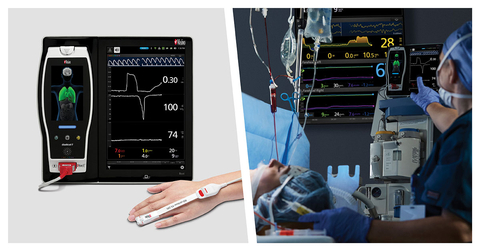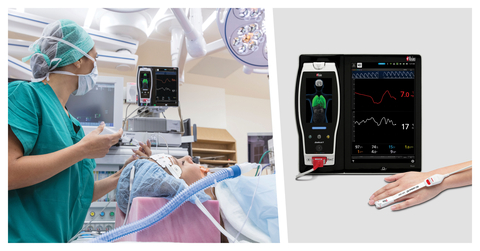预约演示
更新于:2025-05-07
University Healthsystem Consortium, Inc.
更新于:2025-05-07
概览
关联
2
项与 University Healthsystem Consortium, Inc. 相关的临床试验NCT01929005
Integrated Inpatient/Outpatient Care for Patients at High Risk of Hospitalization
The investigators propose an innovative new model of care in which patients identified to be at high risk of hospitalization are offered care by a physician who will direct their care both in the hospital and in clinic but is able to do so because they see patients only at high risk of hospitalization. This allows these physicians to have a panel of patients that is small enough that they can provide them with continuing ambulatory care but sick enough for those physicians to have enough of their patients hospitalized at any time to justify having the physician spend several hours each morning seeing those patients in the hospital, making the model economically viable and clinically valuable for the patient. The investigators estimate that each of the 5 physicians the investigators propose to establish in this model will serve a panel of about 200 patients in steady state with an average of 10 days of expected hospitalization and $75,000 each in Medicare spending per year, totaling $75 million annually. The investigators estimate that a 1% reduction in costs for these patients will be more than enough to cover the ongoing costs of the model the investigators propose; this is because the investigators' program reorganizes care rather than adding new forms of care.
开始日期2012-11-01 |
申办/合作机构 |
NCT01075451
Antimicrobial Drug Use and Resistant Staphylococcus Aureus in a Network of Academic Medical Center Hospitals.
The purpose of this investigation is to study the relationships between antimicrobial stewardship program efforts, antimicrobial drug use, and infection control efforts to the incidence rates of hospital acquired infections with Staphylococcus aureus in a sample of US academic medical center hospitals.
开始日期2010-01-01 |
申办/合作机构 |
100 项与 University Healthsystem Consortium, Inc. 相关的临床结果
登录后查看更多信息
0 项与 University Healthsystem Consortium, Inc. 相关的专利(医药)
登录后查看更多信息
98
项与 University Healthsystem Consortium, Inc. 相关的文献(医药)2019-09-01·American Journal of Medical Quality4区 · 医学
Republished: Physician Assistant and Nurse Practitioner Utilization in Academic Medical Centers
4区 · 医学
Article
作者: Kleinpell, Ruth ; Todd, Barbara ; Krsek, Cathleen ; Moote, Marc
2017-03-01·BMJ Quality & Safety1区 · 医学
The denominator problem: national hospital quality measures for acute myocardial infarction
1区 · 医学
Article
作者: Hohmann, Samuel F ; Karson, Andrew S ; Mort, Elizabeth ; Bruckel, Jeffrey ; Shahian, David M ; Liu, Xiu
2016-09-01·American Journal of Transplantation1区 · 医学
Factors Associated With Major Adverse Cardiovascular Events After Liver Transplantation Among a National Sample
1区 · 医学
Article
作者: Lloyd-Jones, D M ; Skaro, A ; Hohmann, S ; Levitsky, J ; Kang, R ; Serper, M ; VanWagner, L B ; Abecassis, M
13
项与 University Healthsystem Consortium, Inc. 相关的新闻(医药)2023-12-11
瑞士纳沙泰尔--(
BUSINESS WIRE
)--(美国商业资讯)--
Masimo
(NASDAQ: MASI)今天宣布了《麻醉学杂志》(
Journal of Anesthesia
)上发表的一项回顾性研究的结果,其中韩国首尔成均馆大学医学院三星医疗中心的Yu Jeong Bang博士及其同事探讨了Masimo ORi™与动脉氧分压(PaO
2
)之间的关联。研究对象是554名在单肺通气(OLV)期间接受非心脏胸部手术的患者,这使得该研究成为迄今为止关于ORi的最大规模研究。研究人员发现,ORi值“与同时测量的PaO
2
显著相关”,而且ORi“即使在单肺通气期间也能提供关于动脉氧合的有用信息”。
1
无创、连续的Masimo ORi可以连续、实时地了解中度高氧范围(PaO
2
>100和≤250 mmHg)内的血红蛋白氧合情况,可与动脉血气分析一起使用,而动脉血气分析具有有创、间歇和延迟的缺点。ORi是一个不带单位的指数,其数值范围从0.00至1.00,可连续与SpO
2
同步显示,其目的是在患者吸入辅助氧气时,提供对其氧合状况的额外监测,从而扩展并超越传统SpO
2
监测的范围。按照惯例,SpO
2
的上限为100%,但氧饱和度并不受限制,当补充氧气时,氧饱和度可以上升到高氧状态(高于正常氧饱和度状态)。作为SpO
2
监测(使用Masimo SET
®
脉搏血氧仪进行)的补充,ORi为临床医生提供了额外的可视性,让他们能够实时了解氧饱和度何时升高到中度高氧状态,或何时降低至脱离中度高氧状态。
研究人员注意到努力预防高氧血症和低氧血症的重要性,尤其是在需要进行OLV的手术期间,因为此时存在肺部并发症的风险。研究人员试图使用Masimo ORi评估预测即将出现的过氧或低氧的无创连续方法,以克服仅进行有创血气分析的缺点。为了评估ORi的性能,他们分析了从2022年1月1日至12月31日期间在韩国一家三级医院接受需要OLV的非心脏择期胸腔手术的554名患者那里收集的数据。麻醉期间,研究人员使用Masimo RD rainbow SET
®
脉搏碳氧-氧饱和度仪传感器监测ORi,并在OLV启动15分钟后进行血气分析。研究人员的主要目标是探究ORi和PaO
2
值同时变化的关联性。他们还试图找出PaO
2
<150 mmHg的风险因素,因为根据他们的临床经验,在这种情况下,大多数PaO
2
>150 mmHg的患者很少出现低氧血症。
研究人员发现ORi与同时测量的PaO
2
之间存在线性相关。通过线性回归分析,他们发现ORi与OLV启动15分钟后测量的PaO
2
之间存在统计学意义上的显著正相关关系(r
2
=0.5752,p<0.001)。研究者运用接收者操作特征曲线(ROC)分析,确定了在OLV期间,用以检测PaO
2
≥150 mmHg的最佳ORi临界值为0.27(ROC曲线下面积为0.96,95%置信区间为0.94–0.98,灵敏度为0.909,特异性为0.932)。在研究人员确定的PaO
2
<150 mmHg的11个潜在预测因子中,ORi具有高度预测性(几率比=0.001,P<0.001)。
研究人员总结道:“单肺通气时的ORi值与同时测量的PaO
2
值明显相关。因此,即使在单肺通气期间,ORi监测仪也能为估计PaO
2
值提供有用的信息。”
在美国,ORi已获得美国食品药品管理局(FDA)的De Novo认证,可用作手术患者的SpO
2
监测的辅助工具,用于提高监测血红蛋白氧饱和度升高(如因补充氧气导致的饱和度升高)的分辨率。在医院环境中手术期间无运动状态下,ORi功能适用于监测18岁及以上(成人和过渡期青少年)患者使用辅助氧气时的血红蛋白氧饱和度水平。
@Masimo
| #Masimo
关于Masimo
Masimo (NASDAQ: MASI)是一家全球性医疗技术公司,开发生产各种业界领先的监护技术,包括创新的测量设备、传感器、患者监护仪、自动化及互通解决方案。此外,Masimo Consumer Audio旗下有八个著名的音响品牌,包括Bowers & Wilkins、Denon、Marantz和Polk Audio。我们的使命是提高生命质量,改善患者转归并降低治疗成本。1995年,公司推出了Masimo SET
®
移动和低灌注下测量(Measure-through Motion and Low Perfusion™)脉搏血氧饱和度仪,100多项独立客观研究显示其性能优于其他脉搏血氧饱和度仪技术。
2
研究显示,Masimo SET
®
可帮助临床医生减少早产新生儿的重度视网膜病变
3
、改善新生儿的CCHD筛查
4
,在用于术后病房的Masimo Patient SafetyNet™连续监护时,可减少快速响应团队动员、ICU转床和成本。
5-8
Masimo SET
®
据估计已应用于全世界领先医院及其他医疗机构中超过2亿的患者
9
,是《美国新闻与世界报道》(
U.S. News and World Report
) 2022-23年最佳医院荣誉榜排名前10位医院中9家医院采用的主要脉搏血氧饱和度仪。
10
2005年,Masimo推出了rainbow
®
脉搏碳氧-氧饱和度仪技术,实现了以往只能侵入性测量的无创连续血液成份监测,包括总血红蛋白(SpHb
®
)、氧含量(SpOC™)、碳氧血红蛋白(SpCO
®
)、高铁血红蛋白(SpMet
®
)、脉搏灌注变异指数(PVi
®
)、RPVi™ (rainbow
®
PVi)和氧储备指数(ORi™)。2013年,Masimo推出了Root
®
患者监护和互通平台,该平台采用全新设计,尽可能灵活和具有可扩展性,以便添加其他Masimo和第三方监护技术;添加的关键Masimo技术包括下一代SedLine
®
脑功能监护仪、O3
®
局部血氧饱和度仪,以及搭配NomoLine
®
取样线缆的ISA™二氧化碳分析仪。Masimo的连续及点检监护仪Pulse CO-Oximeters
®
系列包括旨在用于各类临床及非临床场合的设备,包括无线可穿戴技术(例如Radius-7
®
、Radius PPG
®
和Radius VSM™)、便携式设备(例如Rad-67
®
)、指尖脉搏氧饱和度仪(例如MightySat
®
Rx)、医院及居家两用设备(例如Rad-97
®
和Masimo W1
®
)。Masimo医院和居家自动化和互通解决方案以Masimo Hospital Automation™平台为中心,包括Iris
®
Gateway、iSirona™、Patient SafetyNet、Replica
®
、Halo ION
®
、UniView
®
、UniView :60™和Masimo SafetyNet
®
。公司不断壮大的健康和患者福祉解决方案组合包括Radius Tº
®
、Masimo W1以及Masimo Stork™。如需了解有关Masimo及其产品的进一步信息,请访问
www.masimo.com
。有关Masimo产品的已发表临床研究,请访问
www.masimo.com/evidence/featured-studies/feature/
。
RPVi尚未获得FDA 510(k)许可,不可在美国销售。Patient SafetyNet商标的使用已获得University HealthSystem Consortium的许可。
参考文献
Bang Y, Seong Y, Jeong H. Association between Oxygen Reserve index nd arterial partial pressure of oxygen during one-lung ventilation: a retrospective cohort study.
J Anesth.
7 Sept 2023. DOI: 10.1007/s00540-023-03259-4(Bang Y、Seong Y、Jeong H。单肺通气时氧储备指数与动脉氧分压之间的关系:一项回顾性队列研究。《麻醉学杂志》。 2023年9月7日。 DOI: 10.1007/s00540-023-03259-4)
有关已发表的脉搏血氧饱和度临床试验以及Masimo SET
®
的优点,详见本公司网站:
http://www.masimo.com
。对照研究包括一些独立、客观的研究,后者包括在科学会议上呈报的摘要和同行评议期刊上的论著。
Castillo A et al. Prevention of Retinopathy of Prematurity in Preterm Infants through Changes in Clinical Practice and SpO
2
Technology.
Acta Paediatr.
2011 Feb;100(2):188-92.(Castillo A等。通过临床实践调整和SpO2技术预防早产儿视网膜病变。《儿科学杂志》。2011年2月;100(2):188-92。)
de-Wahl Granelli A et al. Impact of pulse oximetry screening on the detection of duct dependent congenital heart disease: a Swedish prospective screening study in 39,821 newborns.
BMJ.
2009;Jan 8;338.(de-Wahl Granelli A等。脉搏血氧饱和度筛查对导管依赖型先天性心脏病检出的影响:瑞典39821例新生儿前瞻性筛查研究。《英国医学杂志》。2009年;1月8日;338。)
Taenzer A et al. Impact of pulse oximetry surveillance on rescue events and intensive care unit transfers: a before-and-after concurrence study.
Anesthesiology
. 2010:112(2):282-287.(Taenzer A等。脉搏血氧饱和度监测对救治事件和重症监护室转床的影响:前后巧合研究。《麻醉学》。2010年;112(2):282-287。)
Taenzer A et al. Postoperative Monitoring – The Dartmouth Experience.
Anesthesia Patient Safety Foundation Newsletter
. Spring-Summer 2012.(Taenzer A等。术后监护的达特茅斯经验。《麻醉患者安全基金会通讯》。2012年春夏刊。)
McGrath S et al. Surveillance Monitoring Management for General Care Units: Strategy, Design, and Implementation.
The Joint Commission Journal on Quality and Patient Safety
. 2016 Jul;42(7):293-302.(McGrath S等。普通监护病房的监测监护管理:策略、设计和执行。《质量与患者安全联合委员会杂志》。2016年7月;42(7):293-302。)
McGrath S et al. Inpatient Respiratory Arrest Associated With Sedative and Analgesic Medications: Impact of Continuous Monitoring on Patient Mortality and Severe Morbidity.
J Patient Saf.
2020 14 Mar. DOI: 10.1097/PTS.0000000000000696.(McGrath S等。镇静剂和镇痛剂相关的住院患者呼吸骤停:连续监护对患者死亡率和重度病损率的影响。《患者安全杂志》。2020年3月14日。DOI: 10.1097/PTS.0000000000000696。)
估计值:Masimo存档数据。
http://health.usnews.com/health-care/best-hospitals/articles/best-hospitals-honor-roll-and-overview
。
前瞻性陈述
本新闻稿包含美国《1933年证券法》第27A条和《1934年证券交易法》第21E条以及《1995年私人证券诉讼改革法》所定义的前瞻性陈述。这些前瞻性陈述包括但不限于有关Masimo ORi™在功效的各类陈述。这些前瞻性陈述基于当前对影响我们的未来事件的预期,并且受到各种风险和不确定性的制约。所有风险和不确定性均难以预测,并且多数超出我们的控制,且由于各类风险因素,包括但不限于下列风险因素,有可能导致我们的实际结果与我们的前瞻性陈述中表述的结果大相径庭甚至截然相反:与我们对涉及临床结果可重复性的假设有关的风险;与我们认为Masimo独特的无创测量技术(包括Masimo ORi)可为积极的临床结果和患者安全做出贡献的信念有关的风险;研究人员的结论和发现可能不准确的风险;与我们认为Masimo无创医学突破可提供具有成本效益的解决方案和独特优势的信念有关的风险;与新冠疫情有关的风险;以及我们向美国证券交易委员会("SEC")备案的最新报告中“风险因素”部分所讨论的其他因素,这些报告可从SEC的网站
www.sec.gov
免费获得。尽管我们相信我们的前瞻性陈述中反映的预期是合理的,但我们并不知道我们的预期将来能否被证明正确。本新闻稿包含的所有前瞻性陈述完全符合前述警示性声明。谨此提醒您注意不要对这些前瞻性陈述给予不适当的依赖,这些陈述仅在今日有效。除非适用的证券法律可能有要求,否则我们没有任何义务因出现新信息、未来事件或者其他原因而更新、修正或澄清这些陈述或我们向SEC备案的最新报告中包含的“风险因素”。
免责声明:本公告之原文版本乃官方授权版本。译文仅供方便了解之用,烦请参照原文,原文版本乃唯一具法律效力之版本。

临床结果临床研究
2023-08-21
瑞士纳沙泰尔--(
BUSINESS WIRE
)--(美国商业资讯)--
Masimo
(NASDAQ: MASI) 今天宣布在
Perioperative Medicine(《围手术期医学》)
发表的一项前瞻性随机研究的结果,其中Yu Wang博士及其来自中国深圳、韶关和广州医疗机构的同事通过与传统液体疗法进行比较,评估了无创、连续Masimo PVi
®
作为目标导向液体治疗(GDFT)组成部分,在指导老年患者胃肠道(GI)手术期间的术中输液中的使用情况。研究人员发现,PVi组患者的心肺并发症发生率显著较低(8.4%与19.2%),输液总量也显著降低(输液量中值为2075毫升与2500毫升)。
1
研究人员注意到在胃肠道手术期间优化液体管理的特殊价值,特别是对于老年患者,因为术后并发症发生率高,并且经常出现液体缺乏(由于术前禁食、肠道准备和术中液体流失)。研究人员试图确定使用Masimo PVi的GDFT是否可能改善这种高难度手术场景的结果。 PVi(即脉氧容积变异指数)是呼吸周期内血流灌注指数变化的衡量标准,与基于动脉导管的液体反应性测量方法(例如每搏输出量变化[SVV]和脉压变化[ PPV])相比,这种测量方法的优点是通过无创Masimo Rainbow SET
®
脉搏血氧仪和脉搏CO血氧仪获得。 PVi是特定机械通气成年患者群体液体反应性的无创动态指标。研究人员指出,PVi已在各类手术中显示出与侵入性液体评估方法(如 PPV和SVV)类似的使用效果。
2
研究人员招募了2017年11月至2020年12月期间在两所大学医院计划接受择期胃肠道手术的年龄不小于65岁的患者。患者被随机分配到GDFT组(n = 107)或传统液体治疗(CFT)组(n = 104) 。在GDFT组中,指导液体治疗的PVi由通过指尖的rainbow Set
®
脉搏CO血氧仪传感器测得的光电体积描记波形获取 。两组的评价比较结果为:术后30天复合并发症; 30天心肺并发症(肺炎、肺不张、肺水肿、心律失常和急性心肌梗死);第一次肠胃气胀的时间;术后恶心、呕吐;感染,包括吻合口漏率;以及术后住院时间。
研究人员发现,GDFT (PVi) 组的心肺并发症发生率以及术中输液总量在统计学上显著降低,如下表所示。尽管PVi组有住院时间较短和吻合口漏率较低的趋势,但这些结果和其他结果没有统计学上的显著差异。
Outcome
结果
GDFT (PVi) group
GDFT (PVi)组
CFT group
CFT组
p-Value*
p 值
Median volume of. fluids administered (ml)
输液量中值(毫升)
2075 (interquartile range: 1900, 2600)
2075(四分位距:1900、2600)
2500 (2000, 3100)
0.008
Number (and percentage) of patients with one or more complications
患有一种或多种并发症的患者人数(和百分比)
46 (43%)
43 (41.3)
0.089
…with cardiopulmonary complications
…伴有心肺并发症
9 (8.4%)
20 (19.2)
0.022
…with postop. nausea/vomiting
...伴有术后恶心/呕吐
42 (39.3%)
35 (33.7)
0.398
Median time to first flatus (hours)
首次肠胃胀气的中位时间(小时)
60 (interquartile range: 30, 93)
60(四分位距:30、93)
52 (34, 81)
0.475
Number (and percentage) of patients complicated by anastomotic leakage
并发吻合口瘘的患者人数(及百分比)
1 (0.9%)
5 (4.8%)
0.201
Median postop. length of stay (days)
术后住院时间中值(天)
9 (interquartile range: 8,14)
9(四分位距:8,14)
10 (8, 12)
0.614
*A p-value < 0.05 was considered statistically significant.
*p 值 < 0.05 被认为具有统计显著性
研究人员总结道:“在接受胃肠道手术的老年患者中,基于简单无创PVi的术中GDFT并没有减少术后复合并发症的发生,但与通常的液体管理相比,心肺并发症发生率较低。”
Masimo创始人兼首席执行官Joe Kiani表示:“我们于2007年推出了PVi。这是第一个、也是唯一一种通过脉搏血氧仪无创测量液体反应性的方法,使用我们的脉搏血氧仪,成本仅为侵入性方法的一小部分。并且不会对患者造成侵入性操作的风险。从那时起,PVi为患者护理做出了巨大贡献,其作为液体反应性指标的实用价值已在100多项独立、已发表的研究中得到证明。
2
这项最新研究进一步证明PVi可用于帮助临床医生在不使用侵入性导管的情况下管理患者的体液水平。”
PVi已在美国获得FDA 510(k)批准,作为特定机械通气成年患者群体液体反应性的无创动态指标。 PVi预测液体反应性的准确性是可变的,并受众多患者、手术和设备相关因素的影响。 PVi测量体积描记幅度的变化,但不提供每搏量或心输出量的测量。液体管理决策应基于对患者病情的完整评估,而不应仅基于PVi。
@Masimo
| #Masimo
关于Masimo
Masimo (NASDAQ: MASI) 是一家医疗技术跨国公司,开发和生产各种行业领先的监测技术,包括创新测量、传感器、患者监护仪以及自动化和连接解决方案。此外,Masimo Consumer Audio还拥有八个传奇音响设备品牌,包括Bowers & Wilkins、Denon、Marantz和 Polk Audio。我们的使命是改善生活、改善患者治疗效果并降低护理成本。 Masimo SET
®
Measure-through Motion and Low Perfusion™脉搏血氧仪于1995年推出,已在100多项独立客观研究中证明其性能优于其他脉搏血氧测定技术。
3
Masimo SET
®
还被证明可帮助临床医生减少新生儿出现严重的早产儿视网膜病变,
4
改善新生儿的CCHD筛查,
5
并且在术后病房使用Masimo Patient SafetyNet™进行连续监测时,可以减少快速反应团队的启用、ICU转移和成本。
6-9
Masimo SET
®
预计已用于全球一流医院和其他医疗机构的超过2亿患者。
10
在2022-23 年
U.S. News and World Report(《美国新闻与世界报道》)的
Best Hospitals Honor Roll(最佳医院荣誉榜)的10强医院中,有9家采用Masimo SET作为其主要的脉搏血氧测定仪器。
11
2005年,Masimo推出rainbow
®
脉搏CO血氧测量技术,可无创、连续监测以前只能采用侵入式方式测量的血液成分,包括总血红蛋白 (SpHb
®
)/氧含量 (SpOC™)、碳氧血红蛋白 (SpCO
®
)、高铁血红蛋白 (SpMet
®
)、脉搏变异指数(PVi
®
)、RPVi™ (rainbow
®
PVi)、和氧气储备指数 (ORi™)。2013年,Masimo推出了Root
®
患者监护和连接平台,该平台从零开始,完全采用全新设计,最大限度提高灵活性且可扩展性,以便添加其他Masimo和第三方监护技术; Masimo的主要新增功能包括下一代SedLine
®
脑功能监测、O3
®
区域血氧测定,以及带有NomoLine
®
采样线的ISA™二氧化碳图。Masimo的连续和抽查监测Pulse CO-Oximeters
®
包括设计用于各种临床和非临床场景的设备,包括无线可穿戴技术,例如Radius-7
®
、Radius PPG
®
、和Radius VSM™、便携式设备(比如,Rad-67
®
、MightySat
®
Rx等指尖脉搏血氧计,以及可在医院和家庭使用的设备,比如Rad-97
®
。Masimo医院和家庭自动化和连接解决方案以Masimo Hospital Automation™平台为中心, 包括Iris
®
Gateway、iSirona™、Patient SafetyNet、Replica
®
、Halo ION
®
、UniView
®
、UniView :60™以及Masimo SafetyNet
®
。其不断增长的健康和保健解决方案组合包括Radius T
®
、Masimo W1™和Masimo Stork™。有关Masimo及其产品的其他信息,请访问网站
www.masimo.com
。有关已发表的Masimo产品临床研究,请访问网址:
www.masimo.com/evidence/featured-studies/feature/
.
ORi和RPVi尚未获得FDA 510(k)许可,不可在美国销售。Patient SafetyNet商标的使用已获得University HealthSystem Consortium的许可。
参考文献
Wang Y, Zhang Y, Zheng J, Dong X, Wu C, Guo Z, Wu, X. Intraoperative pleth variability index-based fluid management therapy and gastrointestinal surgical outcomes in elderly patients: a randomized controlled trial. (基于术中脉搏变异指数的液体管理治疗和老年患者胃肠道手术结果:一项随机对照试验。)
Periop. Med.
2023. 12:16. DOI: 10.1186/s13741-023-00308-0.
有关已发表的PVi临床研究,请访问我们的网站:
http://www.masimo.com
。
有关已发表的关于脉搏血氧测定法和Masimo SET
®
优点的临床研究,请访问我们的网站:
http://www.masimo.com
。比较研究包括独立和客观的研究,包括科学会议上提出的摘要和同行评审的期刊文章。
Castillo A 等。 Prevention of Retinopathy of Prematurity in Preterm Infants through Changes in Clinical Practice and SpO
2
Technology. (通过改变临床实践和SpO技术来预防早产儿视网膜病变。)
Acta Paediatr.
2011 Feb;100(2):188-92.
de-Wahl Granelli A等。Impact of pulse oximetry screening on the detection of duct dependent congenital heart disease: a Swedish prospective screening study in 39,821 newborns. (脉搏血氧仪筛查对导管依赖性先天性心脏病检测的影响:瑞典对39,821名新生儿进行的前瞻性筛查研究。)
BMJ.
2009;Jan 8;338.
Taenzer A等。Impact of pulse oximetry surveillance on rescue events and intensive care unit transfers: a before-and-after concurrence study. (脉搏血氧饱和度监测对救援事件和重症监护病房转移的影响:前后并发研究。)
Anesthesiology
. 2010:112(2):282-287.
Taenzer A等。Postoperative Monitoring – The Dartmouth Experience.(术后监测 - Dartmouth经验。)
Anesthesia Patient Safety Foundation Newsletter
. Spring-Summer 2012.
McGrath S等。Surveillance Monitoring Management for General Care Units: Strategy, Design, and Implementation. (普通护理单位的监测管理:策略、设计和实施。)
The Joint Commission Journal on Quality and Patient Safety
. 2016 Jul;42(7):293-302.
McGrath S等。Inpatient Respiratory Arrest Associated With Sedative and Analgesic Medications: Impact of Continuous Monitoring on Patient Mortality and Severe Morbidity. (与镇静和镇痛药物相关的住院患者呼吸骤停:持续监测对患者死亡率和严重发病率的影响。)
J Patient Saf.
2020 14 Mar. DOI: 10.1097/PTS.0000000000000696.
估计:Masimo存档数据。
http://health.usnews.com/health-care/best-hospitals/articles/best-hospitals-honor-roll-and-overview
.
前瞻性声明
本新闻稿包含1933 年《证券法》第27A条和1934 年《证券交易法》第21E条以及1995年《私人证券诉讼改革法》中定义的前瞻性声明。这些前瞻性陈述包括:有关Masimo PVi
®
潜在功效的声明等内容。这些前瞻性声明基于对影响我们的未来事件的当前预期,并受到风险和不确定性的影响,所有这些风险和不确定性都难以预测,其中许多超出了我们的控制范围,并可能导致我们的实际结果与前瞻性声明中表达的结果存在重大和不利的差异,这些风险因素包括但不限于:与我们关于临床结果可重复性的假设相关的风险;与我们相信Masimo独特的无创测量技术(包括Masimo PVi)有助于积极的临床结果和患者安全相关的风险;研究人员的结论和发现可能不准确的风险;与我们相信Masimo无创医疗突破提供具有成本效益的解决方案和独特优势相关的风险;与 新冠病毒相关的风险;以及我们向美国证券交易委员会(“SEC”)提交的最新报告的“风险因素”部分中讨论的其他因素,该报告可从SEC网站免费获取:
www.sec.gov
。尽管我们相信前瞻性声明中反映的预期是合理的,但我们不知道这些预期是否会被证明是正确的。本新闻稿中包含的所有前瞻性声明均明确符合上述警告性声明。请您注意不要过分依赖这些前瞻性声明,这些声明仅代表目前情况。无论是由于新信息、未来事件还是其他原因,我们均不承担更新、修改或澄清这些声明或我们向SEC提交的最新报告中包含的“风险因素”的义务,但根据适用证券法的情况除外。
免责声明:本公告之原文版本乃官方授权版本。译文仅供方便了解之用,烦请参照原文,原文版本乃唯一具法律效力之版本。

2023-06-23
瑞士纳沙泰尔--(
BUSINESS WIRE
)--(美国商业资讯)--
Masimo
(纳斯达克证券代码:MASI)今天宣布,西班牙瓦伦西亚的
Hospital La Fe
正在利用该公司先进的健康跟踪腕表
Masimo W1™
来扩展其远程医疗和远程监护项目。Masimo W1可准确、连续测量关键的生理参数,在美国境外可作为医疗器械使用,并可与
Masimo SafetyNet
®
远程患者管理和远程医疗平台集成。Hospital La Fe是西班牙乃至全世界排名前列的医院之一,从去年开始就在其面向术后患者的加强康复项目中使用Masimo SafetyNet和Radius PPG
®
无线监护系统。在该项目取得初步成功后,该院外科主任、医学博士、哲学博士M. Argente医生现在计划为预约选择性手术的患者事先提供Masimo W1腕表,希望能够通过分析该腕表采集的心率变化数据,来提高预康复能力。
Joe Kiani
(Masimo创始人兼首席执行官)表示: “早在疫情爆发前,Hospital La Fe就一直是成功应用远程医疗和虚拟护理的典范。他们选择将Masimo SafetyNet作为术后居家监护项目的平台,有助于患者提前出院回家,同时跟踪患者的状况,以更主动的方式应对术后并发症,我们对此感到非常荣幸。他们在此基础上更进一步,增加使用Masimo W1,这令我们无比振奋。Masimo W1有利于Hospital La Fe的医生采集丰富且宝贵的术前患者基线数据,从而在进行介入性治疗前,更好地了解对每个患者而言正常和不正常的情况。”
Hospital La Fe麻醉科术前医学主管Oscar Díaz Cambronero医学博士、哲学博士指出: “通过在西班牙Hospital La Fe的加强康复项目中实施Masimo SafetyNet远程监护解决方案,有利于主动诊断术后并发症,提高患者安全性并可允许部分手术患者提前出院。这一未来项目将在术前环境中使用Masimo W1来检验远程监护的影响,以升级术前康复能力,改善患者的状况和参与程度。”
将Masimo W1用于医疗用途尚未在美国获得FDA批准。
@Masimo
| #Masimo
关于Masimo
Masimo(纳斯达克证券代码:MASI)是一家全球性医疗技术公司,开发生产各种业界领先的监护技术,包括创新的测量设备、传感器、患者监护仪、自动化及互通解决方案。此外,Masimo Consumer Audio旗下有八个成功的音响品牌,包括Bowers & Wilkins、Denon、Marantz和Polk Audio。我们的使命是提高生命质量,改善患者转归并降低治疗成本。1995年,公司推出了Masimo SET
®
移动和低灌注下测量(Measure-through Motion and Low Perfusion™)脉搏血氧饱和度仪,100多项独立客观研究显示其性能优于其他脉搏血氧饱和度仪技术。
1
研究显示,Masimo SET
®
可帮助临床医生减少早产新生儿的重度视网膜病变
2
、改善新生儿的CCHD筛查
3
,在用于术后病房的Masimo Patient SafetyNet™连续监护时,可减少快速响应团队动员、ICU转床和成本。
4-7
Masimo SET
®
据估计已应用于全世界领先医院及其他医疗机构中超过2亿的患者
8
,是
《美国新闻与世界报道》
2022-23年最佳医院荣誉榜排名前10位医院中9家医院采用的主要脉搏血氧饱和度仪。
9
2005年,Masimo推出了rainbow
®
脉搏碳氧-氧饱和度仪技术,实现了以往只能侵入性测量的无创连续血液成份监测,包括总血红蛋白(SpHb
®
)、氧含量(SpOC™)、碳氧血红蛋白(SpCO
®
)、高铁血红蛋白(SpMet
®
)、脉搏灌注变异指数(PVi
®
)、RPVi™(rainbow
®
PVi)、氧储备指数(ORi™)。2013年,Masimo推出了Root
®
患者监护和互通平台,该平台采用全新设计,尽可能灵活和具有可扩展性,以便添加其他Masimo和第三方监护技术。添加的关键Masimo技术包括下一代SedLine
®
脑功能监护仪、O3
®
局部血氧饱和度仪、搭配NomoLine
®
取样线缆的ISA™二氧化碳分析仪。Masimo的连续及点检监护仪Pulse CO-Oximeters
®
系列包括旨在用于各类临床及非临床场合的设备,包括无线可穿戴技术(例如Radius-7
®
、Radius PPG
®
和Radius VSM™)、便携式设备(例如Rad-67
®
)、指尖脉搏氧饱和度仪(例如MightySat
®
Rx)、医院及居家两用设备(例如Rad-97
®
)。Masimo医院和居家自动化和互通解决方案以Masimo Hospital Automation™平台为中心,包括Iris
®
Gateway、iSirona™、Patient SafetyNet、Replica
®
、Halo ION
®
、UniView
®
、UniView :60™和Masimo SafetyNet
®
。公司不断壮大的健康和患者福祉解决方案组合包括Radius Tº
®
以及Masimo W1™腕表。欲了解Masimo及其产品的进一步信息,请访问
www.masimo.com
。有关Masimo产品的已发表临床研究,请访问
www.masimo.com/evidence/featured-studies/feature/
。
ORi、RPVi和Radius VSM尚未获得FDA 510(k)许可,无法在美国销售。Patient SafetyNet商标的使用得到了University HealthSystem Consortium的许可。
参考文献
有关已发表的脉搏血氧饱和度临床试验以及Masimo SET
®
的优点,详见本公司网站
http://www.masimo.com
。对照研究包括一些独立、客观的研究,后者包括在科学会议上呈报的摘要和同行评议期刊上的论著。
Castillo A et al. Prevention of Retinopathy of Prematurity in Preterm Infants through Changes in Clinical Practice and SpO
2
Technology.
Acta Paediatr.
2011 Feb;100(2):188-92.(Castillo A等,“通过临床实践调整和SpO2技术预防早产儿视网膜病变”,《儿科学杂志》,2011年2月;100(2):188-92。)
de-Wahl Granelli A et al. Impact of pulse oximetry screening on the detection of duct dependent congenital heart disease: a Swedish prospective screening study in 39,821 newborns.
BMJ.
2009;Jan 8;338.(de-Wahl Granelli A等,“脉搏血氧饱和度筛查对导管依赖型先天性心脏病检出的影响:瑞典39821例新生儿前瞻性筛查研究”,《英国医学杂志》,2009年1月8日;338。)
Taenzer A et al. Impact of pulse oximetry surveillance on rescue events and intensive care unit transfers: a before-and-after concurrence study.
Anesthesiology
. 2010:112(2):282-287.(Taenzer A等,“脉搏血氧饱和度监测对救治事件和重症监护室转床的影响:前后巧合研究”,《麻醉学》。2010年;112(2):282-287。)
Taenzer A et al. Postoperative Monitoring – The Dartmouth Experience.
Anesthesia Patient Safety Foundation Newsletter
. Spring-Summer 2012.(Taenzer A等,“术后监护的达特茅斯经验”,《麻醉患者安全基金会通讯》,2012年春夏刊。)
McGrath S et al. Surveillance Monitoring Management for General Care Units: Strategy, Design, and Implementation.
The Joint Commission Journal on Quality and Patient Safety
. 2016 Jul;42(7):293-302.(McGrath S等,“普通监护病房的监测监护管理:策略、设计和执行”。《质量与患者安全联合委员会杂志》,2016年7月;42(7):293-302。)
McGrath S et al. Inpatient Respiratory Arrest Associated With Sedative and Analgesic Medications: Impact of Continuous Monitoring on Patient Mortality and Severe Morbidity.
J Patient Saf.
2020 14 Mar. DOI: 10.1097/PTS.0000000000000696.(McGrath S等,“镇静剂和镇痛剂相关的住院患者呼吸骤停:连续监护对患者死亡率和重度病损率的影响”,《患者安全杂志》,2020年3月14日,DOI: 10.1097/PTS.0000000000000696。)
估计值:Masimo存档数据。
http://health.usnews.com/health-care/best-hospitals/articles/best-hospitals-honor-roll-and-overview
。
前瞻性陈述
本新闻稿包含美国《1933年证券法》第27A条和《1934年证券交易法》第21E条以及《1995年私人证券诉讼改革法》所定义的前瞻性陈述。这些前瞻性陈述包括但不限于有关Masimo W1™和Masimo SafetyNet
®
潜在功效的各类陈述,以及有关Hospital La Fe采用Masimo W1的陈述。这些前瞻性陈述基于当前对影响我们的未来事件的预期,并且受到各种风险和不确定性制约。所有风险和不确定性均难以预测,并且多数超出我们的控制,且由于各类风险因素,包括但不限于下列风险因素,有可能导致我们的实际结果与我们的前瞻性陈述中表述的结果大相径庭甚至截然相反:与我们对涉及临床结果可重复性的假设有关的风险;与我们认为Masimo独特的无创测量技术(包括Masimo W1和Masimo SafetyNet)可为积极的临床结果和患者安全做出贡献的信念有关的风险;与我们认为Masimo无创医学突破可提供具有成本效益的解决方案和独特优势的信念有关的风险;Hospital La Fe未能实现Masimo W1的预期优势的风险;与COVID-19有关的风险;以及我们向美国证券交易委员会(“SEC”)备案的最新报告中“风险因素”部分所讨论的其他因素,这些报告可从SEC的网站
www.sec.gov
免费获得。尽管我们相信我们的前瞻性陈述中反映的预期是合理的,但我们并不知道我们的预期将来能否被证明正确。本新闻稿包含的所有前瞻性陈述完全符合前述警示性声明。谨此提醒您注意不要对这些前瞻性陈述给予不适当的依赖,这些陈述仅在今日有效。除非适用的证券法律可能有要求,否则我们没有任何义务因出现新信息、未来事件或者其他原因而更新、修正或澄清这些陈述或我们向SEC备案的最新报告中包含的“风险因素”。
免责声明:本公告之原文版本乃官方授权版本。译文仅供方便了解之用,烦请参照原文,原文版本乃唯一具法律效力之版本。

临床研究
100 项与 University Healthsystem Consortium, Inc. 相关的药物交易
登录后查看更多信息
100 项与 University Healthsystem Consortium, Inc. 相关的转化医学
登录后查看更多信息
组织架构
使用我们的机构树数据加速您的研究。
登录
或

管线布局
2026年02月08日管线快照
无数据报导
登录后保持更新
药物交易
使用我们的药物交易数据加速您的研究。
登录
或

转化医学
使用我们的转化医学数据加速您的研究。
登录
或

营收
使用 Synapse 探索超过 36 万个组织的财务状况。
登录
或

科研基金(NIH)
访问超过 200 万项资助和基金信息,以提升您的研究之旅。
登录
或

投资
深入了解从初创企业到成熟企业的最新公司投资动态。
登录
或

融资
发掘融资趋势以验证和推进您的投资机会。
登录
或

生物医药百科问答
全新生物医药AI Agent 覆盖科研全链路,让突破性发现快人一步
立即开始免费试用!
智慧芽新药情报库是智慧芽专为生命科学人士构建的基于AI的创新药情报平台,助您全方位提升您的研发与决策效率。
立即开始数据试用!
智慧芽新药库数据也通过智慧芽数据服务平台,以API或者数据包形式对外开放,助您更加充分利用智慧芽新药情报信息。
生物序列数据库
生物药研发创新
免费使用
化学结构数据库
小分子化药研发创新
免费使用

